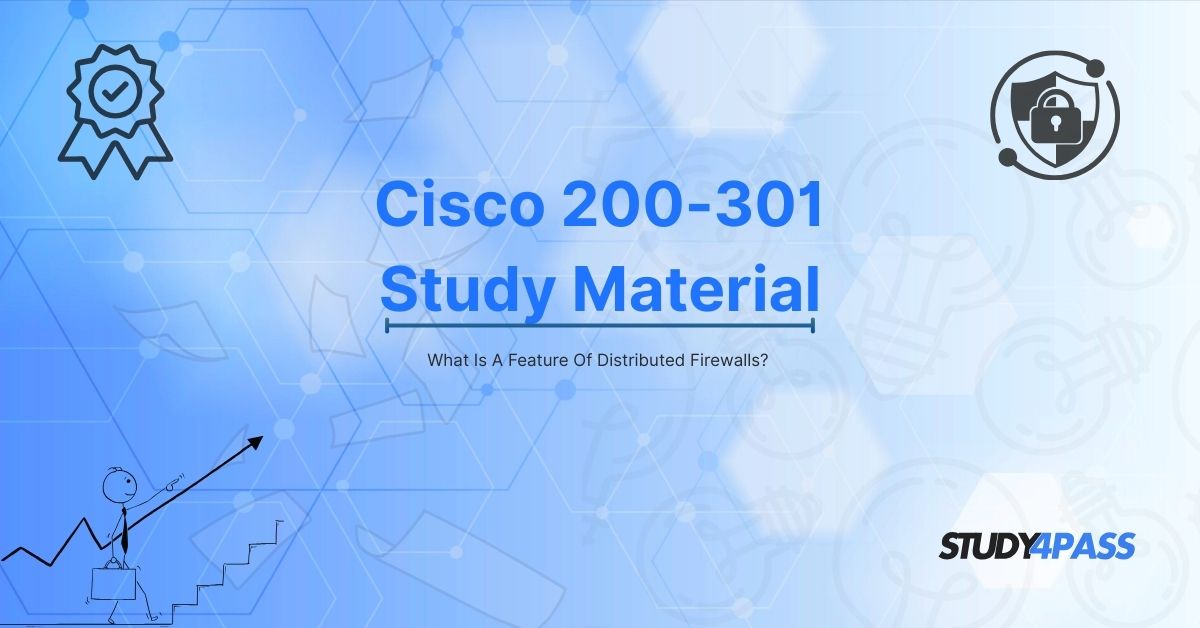Introduction to Firewalls
In today's rapidly evolving cybersecurity landscape, firewalls play a critical role in protecting networks from unauthorized access and malicious threats. Traditional firewalls operate at the network perimeter, but with the rise of cloud computing, virtualization, and remote work, distributed firewalls have become an essential component of modern network security.
This article explores the key features of distributed firewalls, their advantages, and their relevance in the Cisco CCNA 200-301 certification exam. Additionally, we will discuss how Study4Pass provides high-quality CCNA practice tests free and Cisco 200-301 study materials to help aspiring network professionals succeed.
Understanding Distributed Firewalls
A distributed firewall is a security mechanism that enforces firewall policies across multiple network endpoints rather than relying solely on a centralized firewall at the network perimeter. Unlike traditional firewalls, which inspect traffic at a single entry point, distributed firewalls operate on individual hosts, virtual machines (VMs), or cloud instances, providing granular security controls.
Key Features of Distributed Firewalls
- Host-Based Enforcement
- Distributed firewalls operate at the host level, meaning each device or VM runs its own firewall instance.
- This allows for fine-grained access control based on application, user, or process rather than just IP addresses.
- Policies are applied locally on each host rather than at a central choke point.
- This reduces bottlenecks and improves performance in large-scale networks.
- Administrators can push updates to firewall policies across all endpoints remotely.
- This is especially useful in cloud environments where workloads are constantly changing.
- Distributed firewalls are commonly used in virtualized data centers (e.g., VMware NSX, Cisco ACI).
- They provide security for microservices and containerized applications (e.g., Kubernetes, Docker).
- Unlike perimeter-based firewalls, distributed firewalls follow the Zero Trust principle: "Never trust, always verify."
- Every request is authenticated and authorized, regardless of its origin.
- Ideal for hybrid and multi-cloud environments where traffic flows between on-premises and cloud networks.
- Can scale dynamically as new workloads are deployed.
- Since security is enforced at each endpoint, lateral movement by attackers is minimized.
- Even if one host is compromised, others remain protected.
Why Distributed Firewalls Matter in CCNA 200-301?
The Cisco CCNA 200-301 certification covers essential networking concepts, including network security fundamentals. Understanding distributed firewalls is crucial because:
- Modern networks rely on virtualization and cloud technologies, where traditional firewalls are insufficient.
- Cisco’s security solutions, such as Cisco Secure Firewall (formerly Firepower), incorporate distributed firewall capabilities.
- Zero Trust Architecture (ZTA) is a growing trend, and CCNA candidates must be familiar with decentralized security models.
How Study4Pass Helps You Master CCNA 200-301?
Preparing for the CCNA 200-301 exam requires high-quality study materials and hands-on practice. Study4Pass offers:
- Free CCNA Practice Tests – Simulate the real exam environment with up-to-date questions.
- Comprehensive Cisco 200-301 Study Materials – Covering all exam objectives, including network security.
- Detailed Explanations & Performance Analytics – Identify weak areas and improve your score.
By leveraging Study4Pass resources, you can gain a deep understanding of distributed firewalls and other critical CCNA topics, ensuring exam success.
Final Verdicts
Distributed firewalls represent a modern approach to network security, offering host-based enforcement, dynamic policy management, and Zero Trust compliance. As networks become more decentralized, mastering these concepts is essential for CCNA 200-301 certification and real-world networking roles.
For the best preparation, trust Study4Pass for free CCNA practice tests and Cisco study materials. Start your journey toward CCNA success today!
Special Discount: Offer Valid For Limited Time “Cisco CCNA 200-301 Exam Guide”
Actual exam question from Cisco's CCNA 200-301 Syllabus.
Sample Questions for 200-301 CCNA Certification
1. How do distributed firewalls improve security compared to traditional firewalls?
A) By blocking all inbound and outbound traffic by default.
B) By applying security policies directly on endpoints rather than just at the network edge.
C) By requiring physical installation on every device.
D) By using only hardware-based filtering.
2. Which of the following is a characteristic of distributed firewalls?
A) They cannot scale in large networks.
B) They allow centralized management of policies.
C) They only work in offline environments.
D) They do not support remote updates.
3. What advantage do distributed firewalls provide in a cloud environment?
A) They restrict all traffic between virtual machines.
B) They enforce security policies at the VM or container level.
C) They only work with physical servers.
D) They require manual configuration on each cloud instance.
4. How do distributed firewalls handle mobile and remote users?
A) They only protect users inside the corporate network.
B) They apply security policies regardless of the user’s location.
C) They disable protection when users are outside the office.
D) They rely solely on VPNs for security.
5. Which of the following is NOT a feature of distributed firewalls?
A) Host-based policy enforcement.
B) Centralized policy management.
C) Exclusive reliance on perimeter defense.
D) Support for dynamic updates.


